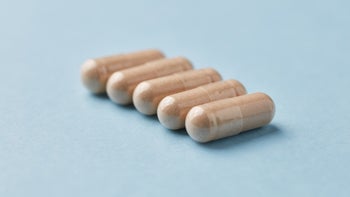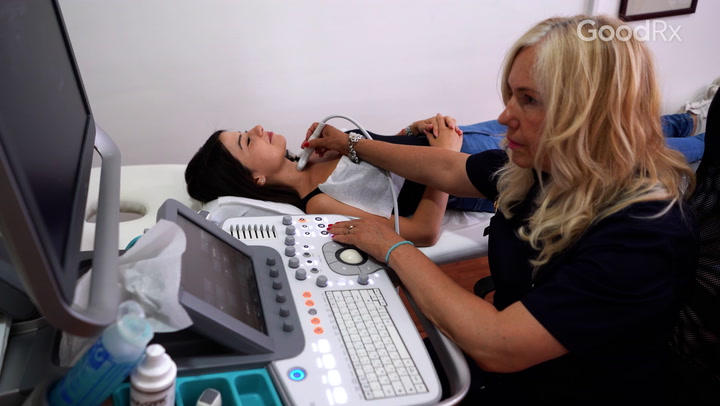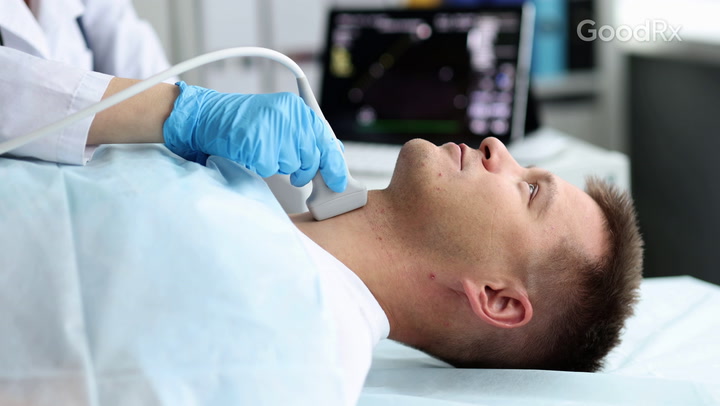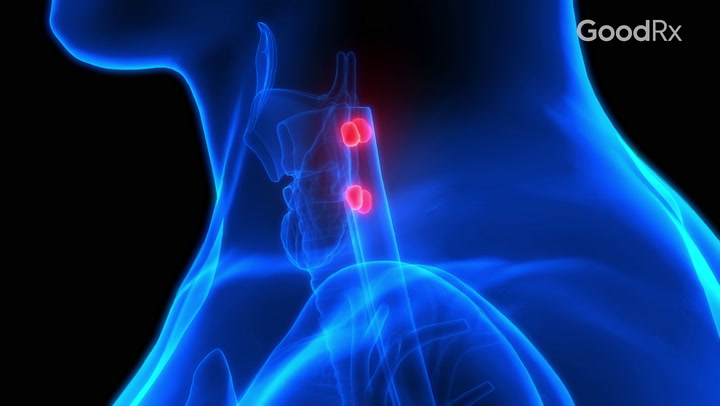
From Prilosec to Coffee, 9 Levothyroxine Interactions to Know About
Key takeaways:
Levothyroxine (Synthroid) has many interactions to consider. This is why it’s best to take levothyroxine by itself on an empty stomach first thing in the morning or at bedtime at least 4 hours after your last meal of the day.
Levothyroxine interactions include antacids, bile acid sequestrants, and proton pump inhibitors. Orlistat (Xenical, Alli), iron, and supplements containing calcium, magnesium, or aluminum can also lower levothyroxine levels.
Coffee, milk, and soy products can reduce levothyroxine levels. So can walnuts and dietary fiber. It’s best to avoid these foods and beverages for at least an hour after taking levothyroxine.
Access savings on related medications
Table of contents

Levothyroxine (Synthroid) is the go-to treatment for low thyroid hormone levels (hypothyroidism). But certain medications, supplements, and foods can interact with it, changing how well it works and the likelihood of side effects.
In this article, we’ll talk about common levothyroxine interactions to be aware of to help ensure you get the most from your medication.
Levothyroxine drug interactions overview
Below we’ve listed levothyroxine interactions to consider. As you can see, levothyroxine has a number of interactions. This is one reason it’s best to take it alone on an empty stomach first thing in the morning or at bedtime at least 4 hours after your last meal of the day.
Save over 70% on Cytomel
Feel your best with Cytomel, a common thyroid medication. Pay as little as $35.10 for 90 tablets of Cytomel with GoodRx - no insurance needed.

Keep in mind, this isn’t a complete list of all possible interactions. So be sure to review your current medication list with your healthcare team to check for any issues.
Levothyroxine interactions include:
Antacids
Sodium polystyrene sulfonate
Sevelamer (Renvela)
Proton pump inhibitors
Orlistat (Xenical, Alli)
Sucralfate
Phenobarbital (Sezaby)
Rifampin (Rifadin)
Amiodarone (Pacerone)
Propranolol (at doses over 160 mg per day)
Iron
Calcium
Aluminum
Magnesium
Coffee
Grapefruit juice
Alcohol
Soy products
Walnuts
Dietary fiber
Let’s take a closer look at 9 of these interactions and how they can affect you.
1. Antacids
Most antacids contain calcium, aluminum, or magnesium to help neutralize stomach acid. Common examples include:
Tums (calcium carbonate)
Rolaids (calcium carbonate / magnesium hydroxide)
Mylanta (aluminum hydroxide / magnesium hydroxide / simethicone)
Tips for taking levothyroxine: These pharmacist-backed tips for taking thyroid hormone medications can help you get the most from your treatment.
Is your thyroid medication working? Here are some signs to look for to help you know your medication is working as it should.
Armour Thyroid vs. levothyroxine: Learn about the differences between these thyroid hormone medications to help you find the right fit for your needs.
Calcium, aluminum, and magnesium form a bond with levothyroxine and prevent your body from absorbing it. You should avoid taking antacids within 4 hours of your levothyroxine dose.
This interaction also applies to dietary supplements that contain calcium, aluminum, or magnesium for the same reason. So be sure to check any supplements or vitamins you take, and separate them from levothyroxine by at least 4 hours.
2. Bile acid sequestrants
Bile acid sequestrants are medications that help treat high cholesterol levels. Examples include:
Colesevelam (Welchol)
Cholestyramine (Prevalite, Locholest)
Colestipol (Colestid)
These medications can lower the absorption of levothyroxine. It’s recommended to take them at least 4 hours before or after your levothyroxine dose.
3. Proton pump inhibitors
Proton pump inhibitors (PPIs) treat chronic heartburn and gastroesophageal reflux disease (GERD). Examples include:
Omeprazole (Prilosec)
Pantoprazole (Protonix)
Esomeprazole (Nexium)
Levothyroxine is best absorbed in an acidic environment. These medications lower the acidity of the stomach, which lowers the absorption of levothyroxine. Since their effects are long lasting, separating levothyroxine from PPIs typically isn’t enough to prevent this interaction.
It’s best to avoid taking PPIs with levothyroxine. But if it isn’t avoidable, let your prescriber know. They may need to check your thyroid hormone level and adjust your levothyroxine dosage to account for this interaction.
4. Orlistat
Orlistat is an oral weight-loss medication that prevents your body from absorbing fat in your diet. It can also interfere with levothyroxine absorption if they’re taken together. So it’s best to avoid taking orlistat within 4 hours of your levothyroxine dose.
5. Iron
Iron supplements help treat anemia caused by low iron levels. Iron comes in several forms, such as ferrous sulfate, ferrous fumarate, and ferrous gluconate.
All forms of iron can form a bond with levothyroxine, preventing its absorption. For this reason, you should take levothyroxine and iron supplements at least 4 hours apart.
6. Coffee and milk
Coffee and milk can both reduce the absorption of levothyroxine if they’re taken together. Separating coffee from levothyroxine by at least 1 hour reduces the risk of this interaction. But you should wait about 4 hours after taking levothyroxine to have milk or other dairy products, such as cheese or sour cream.
7. Soy products
Like iron, soy-based products may form a bond with levothyroxine and limit its absorption. You can avoid this interaction by taking levothyroxine 30 to 60 minutes before or 4 hours after soy products. This interaction seems limited to soy-based foods, such as soy protein and soy formula. Supplements containing soy isoflavones seem less likely to cause an issue.
8. Walnuts
Levothyroxine can bind to walnuts if they’re consumed at the same time. This can prevent levothyroxine from being absorbed properly. You can avoid this by taking levothyroxine 30 to 60 minutes before or 4 hours after eating walnuts.
9. Dietary fiber
Levothyroxine also forms a bond with fiber, which lowers the medication’s absorption. It’s best to avoid high-fiber foods or fiber supplements within 4 hours of your levothyroxine dose.
How long after taking levothyroxine can you take other medications or supplements, and consume food?
Generally, you should take levothyroxine on an empty stomach at least 30 to 60 minutes before breakfast. You can also take it at night at least 4 hours after your last meal of the day.
You can take levothyroxine along with other medications, but check with your healthcare team to make sure they won’t affect how your body absorbs levothyroxine. Interacting medications should generally be spaced 4 hours apart from your levothyroxine dose.
Keep in mind that consistency is key when it comes to taking levothyroxine. Your prescriber should adjust your levothyroxine dosage based on your thyroid hormone levels. If you change how or when you take levothyroxine, those levels could change. So it’s best to stay as consistent as possible to ensure your thyroid hormone levels stay within the goal range.
Frequently asked questions
The only major downside of taking levothyroxine is remembering to take it the same way every day. Otherwise, there’s not much to be concerned about. Levothyroxine helps replace missing thyroid hormone when your levels are low. This helps your body function the way it should. There’s a much greater risk of harm from not taking levothyroxine when you need it than from taking the medication when it's prescribed.
It’s likely fine to take levothyroxine with an occasional dose of acetaminophen (Tylenol) if needed. There aren’t reports of an interaction between the two medications. But you shouldn’t take Tylenol on a regular basis without talking to a healthcare professional.
In most cases, once your thyroid hormone levels reach the goal range, you should notice increased energy levels, improved mood, and less dry skin. Weight loss, improved bowel movements, and less brain fog are also possible. Keep in mind that you need to continue taking levothyroxine every day for these effects to last.
The bottom line
Levothyroxine (Synthroid) has many interactions to consider. This is why it’s best to take levothyroxine by itself on an empty stomach first thing in the morning or at bedtime at least 4 hours after your last meal of the day.
Levothyroxine interactions include antacids, bile acid sequestrants, and proton pump inhibitors. Orlistat (Xenical, Alli), iron, and supplements containing calcium, magnesium, or aluminum can also lower levothyroxine levels. In most cases, it’s best to avoid taking levothyroxine within 4 hours of these medications or supplements.
Coffee, milk, and soy products can also reduce levothyroxine levels. So can walnuts and dietary fiber. It’s best to avoid most of these foods and beverages within 4 hours of taking levothyroxine.
Why trust our experts?



References
A-S Medications Solutions. (2025). Levothyroxine sodium- levothyroxine sodium tablet [package insert].
Garber, J. R., et al. (2012). Clinical practice guidelines for hypothyroidism in adults: Cosponsored by the American Association of Clinical Endocrinologists and the American Thyroid Association. Endocrine Practice.
Guzman-Prado, Y., et al. (2021). Concomitant use of levothyroxine and proton pump inhibitors in patients with primary hypothyroidism: A systematic review. Journal of General Internal Medicine.
Liu, H., et al. (2023). Medications and food interfering with the bioavailability of levothyroxine: A systematic review. Therapeutics and Clinical Risk Management.
MedlinePlus. (2019). Levothyroxine.
Wiesner, A., et al. (2021). Levothyroxine interactions with food and dietary supplements–a systematic review. Pharmaceuticals.

























